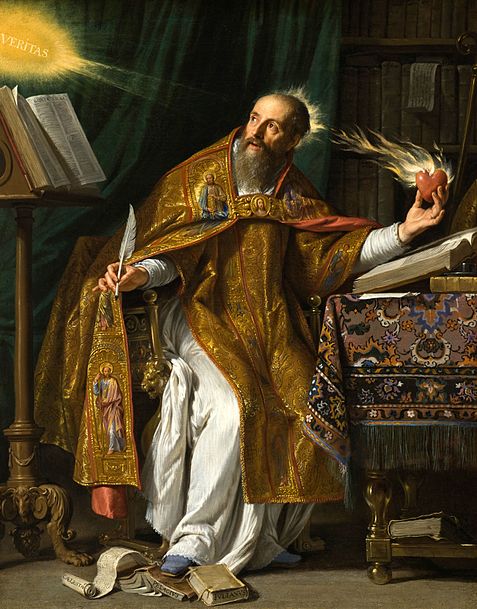
There’s a reason for the mummy in the manger: French artists in the 17th century were fascinated by the paradox that the Word of God was unable to speak and conveyed this tension by having the Christ not merely wrapped, but bound by his swaddling clothes, the Deity deining to be shackled, “the word within a word, unable to speak a word”. This is a speechlessness worth speaking about. After all, what do we really mean when we call Christ the Word of God? What Christian insanity is this, that a word is a person?

Well, in the vein of St. Augustine, chickity-check it out: God is infinite. If an infinite being were to conceive of Himself — that is to say, if God were to think the thought ‘God’ — what would be the logical outcome? When you or I think about ourselves, it is never a perfect thought. We can barely conceive of what we look like, much less who we actually are. But a perfect being would necessarily conceive of Himself…perfectly. Make sense? God conceives of Himself perfectly. But — and here’s the crux — if that thought remained just a thought it would never be perfect. As a mere thought, it would always be missing one crucial characteristic — existence. Inseparable from God is the fact that He exists. He is real. Thus if God were to think of Himself, and that thought were not to actually exist in Reality, He could not be perfect. His thought would not fully contain Who He Is, because existence is central to Who He Is.
But God is perfect. So he conceives of his own being, he thinks the thought ‘God’, and it exists in reality. He speaks his own Name and his Name must exist. The thought remains one with Him — we’d be fools if we claimed that every time we spoke a thought it was lost to us — but it also exists as its own person. We call that person Jesus Christ. He is one with the Father, for he is the Word of the father, yet he exists as an individual person.
So what a marvelous humility for the spoken Word in his divine glory to be struck speechless in his human infancy! We often manufacture a false conception of the Infant, that he was God somehow ‘hiding’ in the body of a little baby. That, since he was God, he could have spoken whenever he wanted to, walked whenever he wanted to, but instead chose to act like the baby he was. As fall as I can tell, this is stupidity. God became man, fully man. He did not merely take on our strengths; he also took on our weaknesses. He took on our helplessness and our inabilities. And in doing so he made this divine declaration:
 Our weaknesses aren’t weaknesses at all. Sin, now there’s weakness. But dependency, humility, and abandon — these are not things be disdained, but embraced. If Christ was humble enough to become man, surely we are to be man enough to become humble? If God depended entirely on Mary, surely we must depend entirely on God? If God shut up and simply was for the first part of his life, surely we must imitate this Divine Speechlessness and, like the littlest of children, take time in silence? The person of Christ turned the entire world on its head, but only because the world was always meant to live in a somersault. Greatness became small, and now Smallness is great. The Source of all Strength became weak, and now “strength is made perfect in weakness.” It all comes down to the prayer the priest mutters over the water and wine: Per huius aquae et vini mysterium eius efficiamur divinitatis consortes, qui humanitatis nostrae fieri dignatus est particeps. We can share in the divinity of Christ, but only when we realize that Christ dictates the terms of this divinity — humility, abandon, dependence, weakness, death, aye, even death on a cross.
Our weaknesses aren’t weaknesses at all. Sin, now there’s weakness. But dependency, humility, and abandon — these are not things be disdained, but embraced. If Christ was humble enough to become man, surely we are to be man enough to become humble? If God depended entirely on Mary, surely we must depend entirely on God? If God shut up and simply was for the first part of his life, surely we must imitate this Divine Speechlessness and, like the littlest of children, take time in silence? The person of Christ turned the entire world on its head, but only because the world was always meant to live in a somersault. Greatness became small, and now Smallness is great. The Source of all Strength became weak, and now “strength is made perfect in weakness.” It all comes down to the prayer the priest mutters over the water and wine: Per huius aquae et vini mysterium eius efficiamur divinitatis consortes, qui humanitatis nostrae fieri dignatus est particeps. We can share in the divinity of Christ, but only when we realize that Christ dictates the terms of this divinity — humility, abandon, dependence, weakness, death, aye, even death on a cross.
So in the last few weeks of Advent, embrace your weakness. Kneel before the manger and worship the Christ-child by imitation of the Christ-child. And never forget that if Christ’s humility is incomprehensible in his humanity, how much more must it be in his body and blood in the form of bread and wine. There, there is the ultimate helplessness. There the Christ deigns not only to be silent, but to be food. Sacrificed for our sake, his ultimate act of weakness is our ultimate source of strength.











